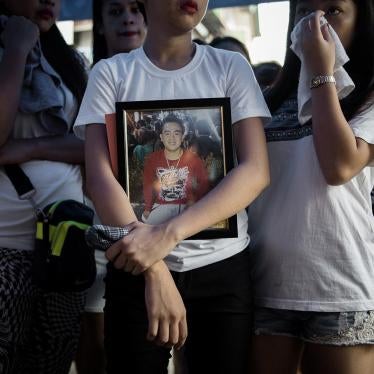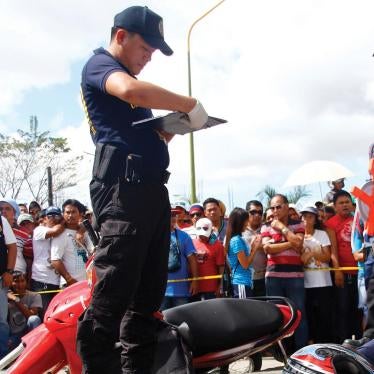European Trade Commissioner Cecilia Malström last week delivered a blunt message to the Philippine government of President Rodrigo Duterte: Your human rights-trampling policies pose a threat to exports to the EU.
Malmström’s list of abusive policies included the killings linked to Duterte’s abusive ‘war on drugs,’ the looming reinstatement of the death penalty, and lawmakers’ efforts to lower the age of criminal responsibility to 9 years of age. Malmström’s warning was no empty threat. She specified that unless the government took action to address the EU’s concerns, the Philippines risks losing tariff-free export of up to 6,000 products under the EU’s human rights benchmarks linked to the Generalized Scheme of Preferences (GSP+) trade scheme.
Philippine presidential spokesman Ernesto Abella on March 11 dismissed those concerns by claiming that the EU is ignorant of the Philippines. “[The EU] cannot just understand what is really happening here,” Abella said, without elaborating. But the human rights calamity unfolding in the Philippines under Duterte demands a stern EU response. Since Duterte took office on June 30, 2016, police and unidentified gunmen have killed more than 7,000 suspected drug users and drug dealers. That death toll doesn’t include the drug war victims that Duterte calls “collateral damage” – children shot dead in anti-drug operations. The government has resisted calls for an independent inquiry into those 2,555 killings attributed to the police by declaring it would harm police “morale.” Meanwhile, Human Rights Watch research has exposed the official narrative regarding the 3,603 killings attributed to “vigilantes” and drug gangs as a strategy to shield police and police agents from culpability in death squad-style extrajudicial killings.
The Philippine government’s reinstatement of the death penalty is also a big step backward in rights protection and for the global campaign to abolish capital punishment. In the past decade, the Philippines has been a leader in Southeast Asia in the campaign against capital punishment. In 2007 it ratified the optional protocol to the International Covenant on Civil and Political Rights on the abolishment of the death penalty – the first in the region to do so. Since then, it has supported several United Nations resolutions reaffirming a moratorium on capital punishment around the world. Now the Philippines will have the dubious distinction of becoming the first party to the protocol to reverse course and restore the death penalty.
Likewise, the Philippine Congress’s consideration of a bill that would lower the age of criminal responsibility from 15 years to 9 is a direct attack on the rights of children. The internationally accepted age of criminal responsibility is 12 years. Under the Convention on the Rights of the Child, which the Philippines has ratified, the arrest, detention, or imprisonment of children should only ever be used as a last resort; instead, rehabilitation should be offered wherever possible. The bill also fails to spell out the rights of children who come into conflict with the law – for example, that they are entitled to have access to a lawyer, to be treated humanely and in an age-appropriate way, and that they will be protected from violence.
The EU isn’t the first close bilateral trading partner and donor to respond to Duterte administration abuses with threats to curtail assistance to the Philippine government. The US government announced on December 14 it would deny the Philippine government a new Millennium Challenge Corporation (MCC) grant due to “significant concerns around rule of law and civil liberties in the Philippines.” The statement alluded to the government’s full-scale assault on basic rights by specifying that criteria for governments receiving MCC aid “includes not just a passing scorecard but also a demonstrated commitment to the rule of law, due process and respect for human rights.”
The EU has sent a much-needed message to the Philippine government that the horrific human toll of its “war on drugs” will carry an economic cost. Other governments with close relations with the Philippines – including Australia, whose Foreign Minister Julie Bishop will visit the Philippines this week – should do likewise in terms of suspensions of financial aid, training programs and equipment sales to the Philippine National Police. Other targeted sanctions could and should follow.
It is no time for “business as usual” with Duterte’s Philippines.








